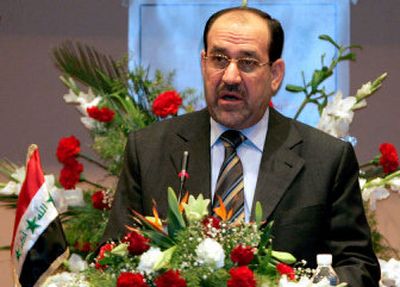Iraqi leader invites ex-soldiers to enlist

BAGHDAD, Iraq – Iraqi Prime Minister Nouri al-Maliki called on former members of Saddam Hussein’s disbanded army to join Iraq’s new security forces in an effort to restore peace to the war-racked country.
Al-Maliki’s remarks came at the beginning of a two-day national reconciliation conference intended to unite ethnic, religious and political groups behind a strategy for ending the sectarian warfare that kills scores of civilians each day.
His decision to welcome back members of the former Sunni Arab-dominated army is a key concession. In another conciliatory move, al-Maliki, a Shiite Muslim, urged political leaders to review the law that banned loyalists of Saddam’s Baath Party from working in government and to ensure protections for their families.
The former U.S. administrator in Iraq, Paul Bremer, dissolved the Iraqi army after U.S.-led forces toppled Saddam’s government, leaving a pool of unemployed Sunnis to swell the ranks of the insurgency.
“The new Iraqi army has opened its doors to the members of the former army, whether officers or enlisted men,” al-Maliki said. “The national unity government is ready to absorb those who have the desire to serve their country on a professional basis.”
Junior officers from Saddam’s army had already been allowed into the new force. Al-Maliki’s invitation Saturday was more far-reaching and would apply to officers of all ranks. He said soldiers and officers would be reintegrated into the army as long as there was space for them and a need for their expertise. Those who do not return would receive pensions, he said.
More than 250 representatives from various political blocs attended the meeting, which is scheduled to continue today in Baghdad’s heavily fortified Green Zone. Organizers would not release a list of participants but said some Baath Party loyalists with no ties to the Sunni insurgency were present.
“Reconciliation is the lifesaver which will lead us to the shores of safety, because the alternative is nothing but death and destruction,” al-Maliki said.
It was unclear, however, how much progress the conference’s participants could make given that some key leaders boycotted it. The most notable absence was that of radical Shiite cleric Muqtada al-Sadr, who controls a powerful bloc in parliament as well as the militia believed to be driving much of the violence. As the meeting was beginning Saturday, a representative from the Iraqi National Accord, the party of former Prime Minister Ayad Allawi, said the group was withdrawing from the conference because it felt important groups were excluded.
Organizers of the conference said they extended invitations to all political, ethnic and religious groups, including opponents of the government. They said they were disappointed that some had not accepted their invitation.
“We don’t feel we had all the groups in attendance,” said Ali Dabbagh, a government spokesman. “We think there should be more conferences on the issues.”